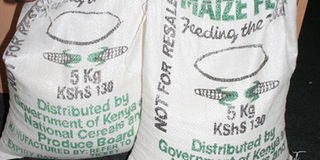Plan to sell subsidised maize flour halted

The subsidised maize flour that the government commissioned millers to prepare. Only 26 per cent of the available flour has been distributed to the market. Photo/FILE
As the controversy in the maize sector rages on, it has emerged that Kenyans will have to wait longer for the promised subsidised maize flour as the National Cereals and Produce Board rethinks its distribution mechanism.
This leaves the government’s plan to provide flour at Sh130 for a 5kg bag still at the crawling stage; only 26 per cent of the available flour has been distributed to the market.
The Sunday Nation can also reveal that the first batch of the 56,800 bags allocated to millers by the government to make the subsidised flour, only 39,423 have been collected. From these, the government expects to get 425,235 five-kilogramme bags of flour and 71,610 10-kilogramme bags of flour.
But Agriculture assistant minister Kareke Mbiuki told the Sunday Nation that they had only collected 11,214 five-kilogramme bags of flour and 14,746 10-kilogramme bags.
He said the ministry accepted blame for not having been able to feed Kenyans as planned, explaining however that the board lacks the necessary storage facilities to keep the flour if it were to collect all the milled and packed bags.
“We agree that we have been unable to distribute the flour. This is largely because of the limited outlets of the Kenya Cereals and Produce Board (NCPB),” he explained.
But for the commercial purposes the millers, according to records made available by NCPB MD Prof Gideon Misoi, had received a total of 342,538 bags of maize from the first tranche and 9,947 bags from the second tranche as of Saturday.
Prof Misoi told the Sunday Nation, in total the millers have collected more than 350 000 bags of maize. “This is despite the fact that we have allocated them over 800,000 bags. They collect what they can be able to pay for. This is also determined by their milling capacity,” he said.
Mr Kareke rebutted earlier allegations that the maize allocated to millers could not be accounted for, saying it was being held by the NCPB until millers pay for it. “But for the maize they mill for us, they will collect when we collect the entire earlier flour,” he said.
On the other hand the contract for milling was hurriedly crafted and had not taken into consideration the by-products of the milling process. This led the permanent secretary in the ministry of Agriculture to direct for a renegotiation of the milling cost.
“Earlier we had agreed that we will pay Sh200 per 90-kg bag milled. We are however negotiating with millers with the aim of reaching an agreement on how to treat the buy products,” he said.
Sources in the milling industry had told the Sunday Nation that husks and bran from the first tranche were valued at more than Sh45 million.
“Among the consideration at the table is the possibility of us costing the value of the by-products and compare it with the cost of milling with an aim of settling the bill depending on who owes who,” said Mr Kareke.



